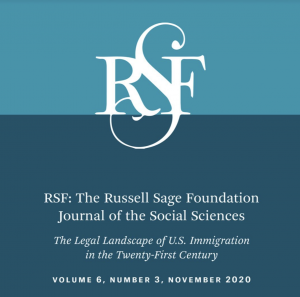
Immigration has long been viewed as both essential to American society and a polarizing political issue. Recent flashpoints around immigration include a U.S. Supreme Court decision upholding the legality of Deferred Action for Childhood Arrivals (DACA), enacted in 2012, to provide a pathway to citizenship for young, undocumented immigrants. The Trump administration has limited visas for foreign workers, banned travelers from predominantly Muslim countries, narrowed asylum-seeking procedures, and increased immigration enforcement. In this issue of RSF, edited by demographer Katharine M. Donato and economist Catalina Amuedo-Dorantes, an interdisciplinary group of scholars traces the history and contemporary landscape of legal immigration to the United States.
Donato and Amuedo-Dorantes outline immigration policies from 1880 to the present and address the impact of the COVID-19 pandemic on immigration. They document that many recent immigration policies were implemented through presidential executive orders rather than Congressional legislation, making families and workers who enter the country without proper documentation especially vulnerable. They also examine the extent to which some of these orders privilege some racial and ethnic groups and exclude others.
Other contributors investigate the complex ways in which immigrants secure visas, work permits, and citizenship, including through employment and family ties, and special statuses for military veterans, refugees, asylum seekers, and unaccompanied minors. Daniel Costa writes about how the immigration status of temporary migrant workers exposes them to workplace abuses because they fear losing their jobs and being deported if they complain about unfair labor practices. Pia Orrenius and Madeline Zavodny analyze the substantial increase in employer demand for temporary work visas, demonstrating how improved economic conditions have created a viable alternative to hiring unauthorized workers. Other contributors examine the experiences of immigrants with special statuses, including veterans.
Van C. Tran and Francisco Lara-García show that schooling and employment, along with strategic financial, community building, and other support services, are critical factors in the successful integration and improved socioeconomic outcomes of refugees from various countries. Luis Edward Tenorio finds that the range of legal systems that adjudicate the laws for children with special immigrant juvenile status make for the uneasy and uneven integration of unaccompanied minors into social institutions.
This issue of RSF is a timely contribution that will invigorate scholarly inquiry on the legal immigration system.
Read more about this issue of RSF and download the full issue for free.